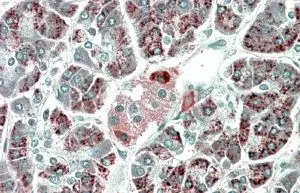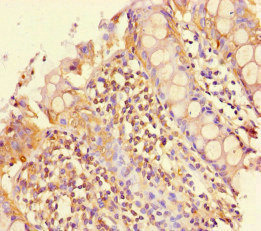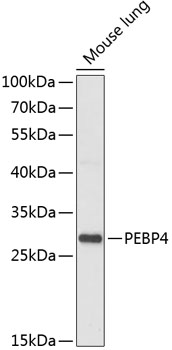
WB analysis of human heart lysate using GTX88268 PEBP4 antibody, C-term. Dilution : 1μg/ml Loading : 35μg protein in RIPA buffer
PEBP4 antibody, C-term
GTX88268
ApplicationsWestern Blot, ImmunoHistoChemistry, ImmunoHistoChemistry Paraffin
Product group Antibodies
ReactivityHuman
TargetPEBP4
Overview
- SupplierGeneTex
- Product NamePEBP4 antibody, C-term
- Delivery Days Customer7
- Application Supplier NoteWB: 1-3microg/ml. IHC-P: 5-10microg/ml. *Optimal dilutions/concentrations should be determined by the researcher.Not tested in other applications.
- ApplicationsWestern Blot, ImmunoHistoChemistry, ImmunoHistoChemistry Paraffin
- CertificationResearch Use Only
- ClonalityPolyclonal
- Concentration0.50 mg/ml
- ConjugateUnconjugated
- Gene ID157310
- Target namePEBP4
- Target descriptionphosphatidylethanolamine binding protein 4
- Target synonymsCORK-1, CORK1, GWTM1933, HEL-S-300, PEBP-4, PRO4408, hPEBP4, phosphatidylethanolamine-binding protein 4, cousin-of-RKIP 1 protein, epididymis secretory protein Li 300, epididymis secretory sperm binding protein, protein cousin-of-RKIP 1
- HostGoat
- IsotypeIgG
- Protein IDQ96S96
- Protein NamePhosphatidylethanolamine-binding protein 4
- Scientific DescriptionThe phosphatidylethanolamine (PE)-binding proteins, including PEBP4, are an evolutionarily conserved family of proteins with pivotal biologic functions, such as lipid binding and inhibition of serine proteases (Wang et al., 2004 [PubMed 15302887]).[supplied by OMIM, Dec 2008]
- ReactivityHuman
- Storage Instruction-20°C or -80°C,2°C to 8°C
- UNSPSC12352203






